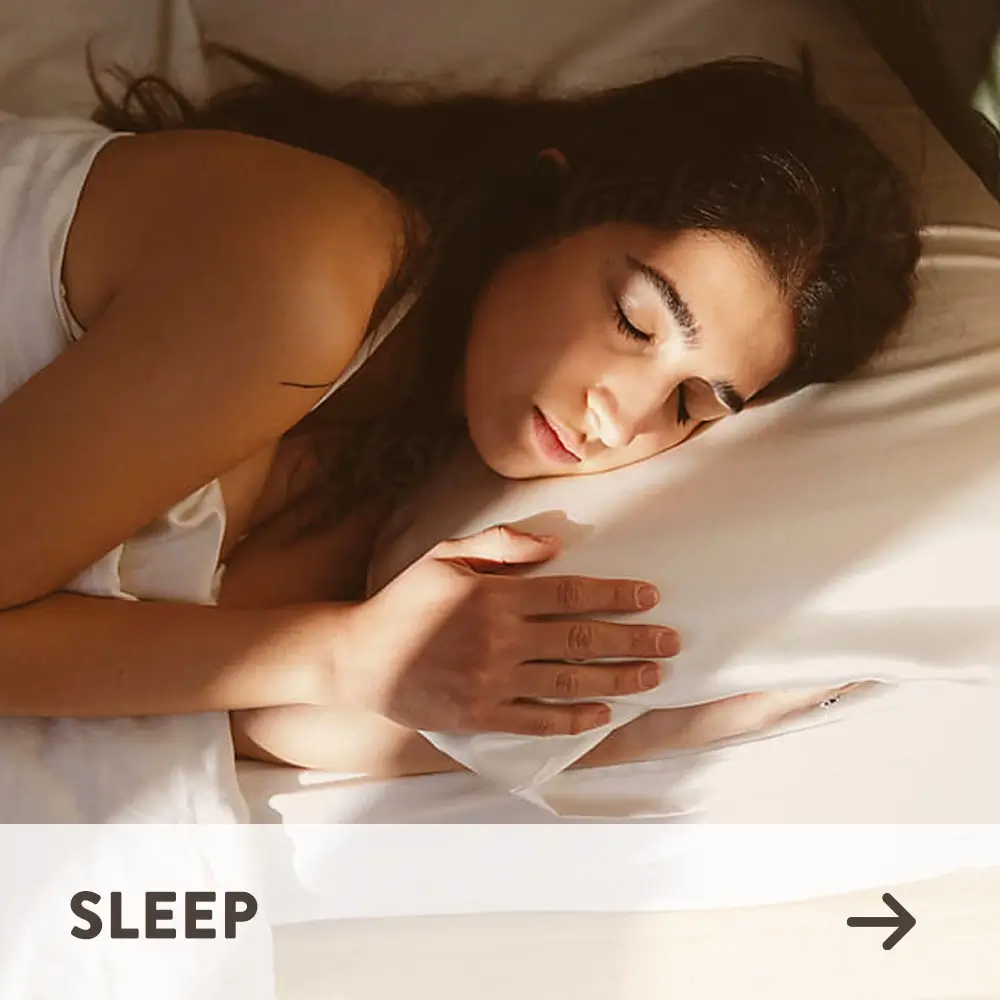Waking up with a stiff neck can ruin your day before it even begins. A neck discomfort can make it difficult to get a good night’s sleep. But don’t worry, you can make simple changes to your sleeping position and bedding to ease discomfort. Adjusting your sleep position and using the right products can significantly improve your sleep quality.
Read on to learn how to sleep with a stiff neck, ways to prevent neck pain, and product tips to help you wake up refreshed. From adjusting your sleep posture to choosing the right pillow, we’ve got you covered. Let’s find out how to turn your nights from painful to peaceful and get you back to enjoying your sleep.
What Are the Common Causes of a Stiff Neck?
You wake up with neck pain, and you wonder why. Many factors can contribute to a stiff neck, disrupting your good night’s sleep and daily comfort. Knowing these causes can help you address and prevent neck pain.
- Sleeping Position. An awkward angle or the wrong sleeping position can strain your neck muscles. Stomach sleeping can twist your neck, causing discomfort. Side sleeping with a supportive pillow keeps your neck in a neutral position, reducing muscle strain.
- Poor Posture. Hunching over your phone or computer puts extra stress on your neck muscles. This poor posture can lead to muscle strain and neck stiffness. Keeping your head forward and shoulders back can help maintain proper alignment.
- Injury. A sudden jerk from activities like sports or even a car accident can result in a painful neck. These incidents can strain the muscles and ligaments in your neck, causing stiffness and discomfort.
- Stress and Tension. Nervous or worried thoughts can cause muscle tension. This muscle tension often leads to a sore or stiff neck. Gentle stretching and relaxation techniques can help relieve muscle tension and ease neck pain.
- Worn-out Pillow. Using the wrong pillow or an old one that doesn’t support your cervical spine can worsen neck pain. A cervical pillow provides better support and helps maintain a neutral position, reducing neck stiffness.

What Are the Common Symptoms of a Stiff Neck?
Sleeping with neck pain can be frustrating and uncomfortable. Recognizing the symptoms helps you address the issue effectively and find relief. Here are some common symptoms to watch for:
- Neck Pain. You may feel discomfort or soreness in your neck. This neck pain can range from a dull ache to a sharp, stabbing sensation. It can affect your daily tasks and disrupt your sleep quality.
- Limited Range of Motion. Stiff neck muscles can make it hard to turn your head. You might struggle with simple movements like looking over your shoulder or nodding your head. This limited movement can interfere with tasks such as driving or exercising.
- Muscle Tightness. Tight muscles in your neck can cause tension and stiffness. This muscle tension often leads to a feeling of tightness in the neck and upper back. It can also extend to the shoulders and shoulder blades, causing additional discomfort.
- Headaches. Stiff neck muscles can lead to headaches. The tension in your neck can radiate to your head, causing discomfort. These headaches often start at the base of the skull and can spread to the forehead or temples.
- Pain that Worsens with Movement. Neck movements can worsen the pain. Activities like turning your head, looking up, or bending your neck forward can increase your discomfort.
Understanding what causes your neck pain and how to manage it can lead to more restful nights and pain-free days.
How Long Should a Stiff Neck Last?
A stiff neck usually lasts a few days to a week, depending on what caused it and how you treat it. Mild cases, often from sleeping at an awkward angle or muscle strain, usually get better in a few days with proper care.
If you experience neck pain from sleeping, changing your sleeping position and using a supportive pillow can help you feel better faster. Chronic neck pain or pain from poor posture might take longer to go away and may need physical therapy.
If your neck stiffness lasts over a week or worsens, you should see a physical therapist for help. Taking care of your symptoms early and making changes can help reduce neck pain and improve your overall well-being.
Best Sleeping Positions for Neck Pain
Finding the best sleeping positions can make a big difference in reducing neck pain. The right sleep position helps keep your spine aligned and can prevent waking up with a stiff neck. Let’s explore how back sleepers, side sleepers, and stomach sleepers can adjust their positions for better neck pain relief.
Back Sleepers
If you sleep on your back, you’re in luck. Back sleeping is often considered one of the best sleeping positions for neck pain. It helps keep the natural curve of your cervical spine, reducing the risk of neck strain. Use a cervical pillow to support your neck and keep your head in a neutral position.
Avoid using too many pillows, as they can push your head upward and cause neck pain. This sleep posture promotes a good night’s sleep by keeping your neck muscles relaxed and aligned.
Side Sleepers
Side sleeping is also a good option for neck pain relief. When sleeping on your side, keep your head in line with your spine to avoid neck stiffness. Ensure you have a medium firm mattress and a supportive pillow to properly fill the space between your neck and the mattress. This helps maintain a straight line from your neck to your spine.
Make sure your sleep position doesn’t cause your shoulder to push up, which can lead to muscle tension. A comfortable pillow can provide extra support and improve your sleep quality.
Stomach Sleepers
Stomach sleeping is the least advisable position for neck pain. It forces your neck into an awkward angle, increasing the risk of muscle strain and neck stiffness. If you must sleep on your stomach, use a very thin pillow or no pillow at all to reduce the angle of your neck.
Try to transition to sleeping on your back or side to ease neck pain. Stomach sleepers often experience more neck pain due to the unnatural position of their cervical spine. Switching to a better sleep position can help reduce neck pain and improve overall spine health.
What Type of Pillows May Comfort a Stiff Neck?
Selecting the right pillow can make a difference in relieving neck pain and sleeping well. The right pillow supports your neck muscles and keeps the natural curve of your cervical spine.
- Cervical Pillow. Made to support the natural curve of your neck, a cervical pillow can help reduce neck stiffness and discomfort. It keeps your head and neck in a neutral position, preventing awkward angles that cause muscle strain.
- Memory Foam Pillow. This pillow conforms to your head and neck, giving you personalized support. This helps relieve neck pain by distributing weight evenly and reducing pressure points.
- Feather Pillow. Feather pillows are soft and easily adjustable, allowing you to shape them for better neck support. However, they may need frequent fluffing to maintain their shape and support.
- Water Pillow. Water pillows offer adjustable firmness by adding or removing water. They provide good support, keeping your neck in a comfortable position.
- Medium Firm Pillow. A medium-firm pillow strikes a balance between soft and firm, offering good support without being too hard. It maintains the alignment of your neck with your spine and helps reduce muscle tension.

What Type of Mattresses May Comfort a Stiff Neck?
The right mattress can play a big role in reducing neck pain and improving your sleep quality. A supportive mattress helps keep your spine aligned and reduces muscle tension.
- Medium Firm Mattress. A medium firm mattress provides a good balance of support and comfort. It keeps your spine in a neutral position, which can help reduce neck pain and muscle strain. This type of mattress is often recommended for people experiencing neck pain.
- Memory Foam Mattress. Memory foam mattresses shape themselves to your body, giving you personalized support. It distributes your weight evenly and reduces pressure points, easing neck pain and improving sleep quality.
- Latex Mattress. Latex mattresses are known for their durability and support. They provide a firm yet comfortable surface that supports your neck and spine, helping to reduce stiffness and discomfort.
- Hybrid Mattress. Hybrid mattresses combine the support of innerspring coils with the comfort of foam or latex. This combination offers both support and cushioning, which can help relieve neck pain and enhance sleep quality.
- Adjustable Bed. This type of bed allows you to change the position of your mattress, providing customizable support. Elevating your head slightly can reduce neck pain and improve your sleep posture.
How to Naturally Soothe a Stiff Neck
Handling a stiff neck can be a pain, but there are natural ways to soothe it. These methods can help reduce neck pain and improve your overall comfort.
- Massage the Area. Gently massaging your neck muscles can help relieve muscle tension and improve blood flow. This can reduce stiffness and ease neck pain.
- Apply Heat or Ice. Using a heating pad or ice pack on your neck can decrease puffiness and relax tight muscles. Heat therapy can relax stiff muscles, while ice can reduce pain and inflammation.
- Stretch Your Neck Muscles. Gentle stretching exercises can help relieve neck stiffness and improve your range of motion. Try neck stretches that target tight muscles and improve flexibility.
- Try Soothing Hemp Products. Hemp products, like Cheef Botanicals CBD gummies, can help provide natural discomfort relief. Our CBD + CBN Gummies for Sleep combines hemp-derived CBD and CBN with melatonin to promote better sleep and overall well-being. For a heightened experience, our D9 THC + CBN Gummies for Sleep combine Delta 9 THC and CBN with melatonin, offering full-body calm and powerful sedation. Both options contain natural ingredients and delicious fruit flavors.
- Take a Hot Shower or Bath. A shower or bath before sleep can help relax your neck muscles and reduce stiffness. The heat from the water helps improve blood flow and ease muscle tension.
- Drink Plenty of Water. Staying hydrated is important for muscle health. Drinking water can help prevent muscle strain and keep your neck muscles flexible.
- Eat Foods Rich in Omega-3 Fatty Acids. Foods like fish, flaxseeds, and walnuts are rich in omega-3 fatty acids. These nutrients aid in reducing swelling and enhancing overall muscle health.
Tips to Prevent Getting a Stiff Neck
Preventing a stiff neck can prevent a lot of discomfort and pain. Here are some simple tips to help you keep your neck muscles healthy and avoid neck pain.
- Maintain Good Posture. Keep your head forward and your shoulders back while sitting or standing. Maintaining poor posture can lead to neck muscle strain and stiffness.
- Use a Supportive Pillow. Choose a cervical pillow that keeps your neck in a neutral position while you sleep. A good pillow helps reduce neck pain from sleeping in the wrong position.
- Adjust Your Sleeping Position. Sleeping on your back or side is better for your neck. Sleeping on your stomach can cause a severe neck strain, so it’s best to avoid this position.
- Take Breaks from Screen Time. Make sure to take frequent breaks if you use your phone or computer for extended periods. This helps prevent muscle tension and keeps your neck muscles relaxed.
- Exercise Regularly. Gentle stretching and neck exercises can strengthen your neck muscles and improve flexibility. Exercising regularly can help prevent chronic neck pain and boost spine health.
- Avoid Carrying Heavy Bags. Using one shoulder to carry heavy bags can lead to neck muscle strain. To avoid muscle tension, try using a backpack or balancing the weight.
Following these essential tips can reduce the chances of getting a stiff neck and enjoy a pain-free life. Taking care of your neck muscles and maintaining good habits can greatly improve your overall well-being.
What to Avoid When Experiencing a Stiff Neck
To prevent your stiff neck from getting worse, avoid activities that strain your neck muscles. Also, avoid carrying heavy bags, sleeping in awkward positions, making sudden neck movements, and spending long periods in poor posture.
Give your neck muscles time to heal with rest and gentle care. Using a heating pad and stretching exercises can help ease neck pain and promote recovery. Remember to maintain good posture to prevent further discomfort.
When to See a Doctor for a Stiff Neck
Sometimes, a stiff neck needs more than just home care. If your neck pain persists for more than a week or gets worse, you should see a physical therapist. If neck pain flares disrupt your daily activities or sleep quality, you should seek medical advice.
Additionally, if your neck stiffness follows a car accident or injury, you must get checked out to rule out serious issues. A doctor can provide neck pain relief strategies and recommend treatments to help you feel better.
Other Symptoms to Watch for
While a stiff neck is uncomfortable, other symptoms can indicate a more serious problem. If you experience severe headaches along with neck pain, it could be a sign of something more serious. Watch for symptoms like jaw pain or shoulder blade discomfort, which can be related to neck issues.
If you notice numbness or tingling in your arms or hands, this might indicate nerve involvement. Difficulty swallowing or breathing alongside neck stiffness should also prompt a visit to the doctor. Paying attention to these symptoms helps ensure you get the right care for your neck pain and overall health.
Final Thoughts – How to Sleep With a Stiff Neck
Dealing with a stiff neck can be frustrating, but gradually changing your sleeping habits can make a huge difference.
We’ve discussed the best sleeping positions for neck pain, such as back and side sleeping, and the importance of using a supportive pillow like a cervical or memory foam pillow. Maintaining good sleep hygiene and staying hydrated can prevent neck stiffness. Gentle stretching and heat therapy can also ease muscle tension and reduce neck pain.
Adding a natural remedy like our hemp products can also help soothe a stiff neck. Our CBD + CBN Gummies for Sleep and D9 THC + CBN Gummies for Sleep combine high-quality natural ingredients to promote better sleep and relieve natural discomfort. Use this guide and our hemp products to help you find the best solutions for sleeping with a stiff neck.
 Free shipping over $99!
Free shipping over $99!

 Sale
Sale 
























